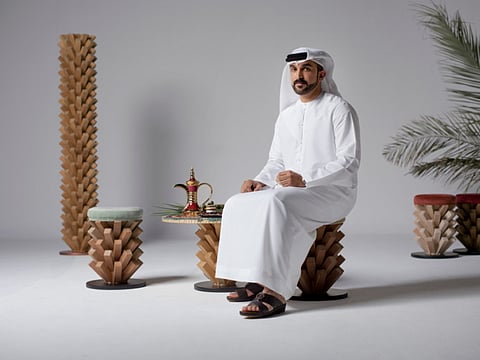Khalid Shafar’s fascinating journey into design
The Emirati designer has been hailed for his creations, but says there’s a lot more work to be done in the UAE

Khalid Shafar is on a mission. The 36-year-old Emirati designer, who opened his studio in 2011, says many people still do not understand the world of design.
“I don’t blame them. There’s a lack of education on the issue,” he says, adding one of the biggest challenges he still faces, is “people’s perception of design and being able to make communities and audiences understand what we do and why we do it”.
That’s why, he hopes his latest collaboration with Level Shoes, will be part of that education.
Shafar has joined hands with research and educational group Cultural Engineering to create a campaign for the retailer called The Secret Life of Date Palms. Using pieces from his collection called The Palm — which includes stools, benches, coffee tables and coat stands — and fusing it with Cultural Engineering’s book about palm trees, the Ramadan campaign aims to spread awareness about the history of dates and its importance to Middle Eastern culture.
An accompanying video of Shafar’s collection features Emirati personalities: fashion designer Khulood Thani, entrepreneur Abdulla Al Mulla, communications executive Aida Al Busaidy and pilot Mohammad Al Mayed. According to the designer, the people selected are influential and established individuals. He describes how happy he was for showcasing them with his designs and says: “The choice was excellent, and I’m really happy that Level Shoes chose them.”
Shafar was approached by Cultural Engineering for the campaign.
“Cultural Engineering had a mix of both information and entertainment where they provided a lot of information about dates which go together with it with photographs,” he says. “They found that my collection [was] suitable to be part of the display and this is how the connection started.
“Cultural Engineering took part of the narrative and content whereas I came in to showcase the narrative with physical objects… it’s like we all aligned on the same page and this is where it was the perfect match… besides being part of the campaign, I feel it is one of the strongest campaign’s Level has done for Ramadan. Especially if you’ve seen the video, it was very emotional and personal,” he adds.
Shafar says his collection, The Palm, started with a minor observation.
“It was my observation of things hanging on the palm tree and how we use it to hang towels and plastic bags,” he says, explaining that the first piece of the collection was The Palm coat stand.
The collection, which began in 2011, is now a continuing series.
Shafar graduated with two degrees — one in Business Management and the other in Interior Design at the American University in Dubai. He started off his career in marketing, but after eight years he decided he needed to explore other opportunities. He moved to New Zealand to study furniture making for two years. Soon after, his first gallery Kasa was born.
“Kasa was aimed at showcasing my work and to become a reference to people who want to see Emirati design,” he recalls. “I was possibly the only one at that time who started [design]. So just explaining what you do was a major challenge.”
Unlike the West, design in the Middle East has certain perceptions and cliches, according to Shafar, who says people would sometimes think he was a carpenter.
Production was another major challenge.
“Until now, I think production is very limiting in terms of opening doors for individual designers to come and sample things that might work,” he says. “Everything is set up for business-to-business markets and trading. So I don’t think there were a lot of options for me.”
It was in 2012, following the start of Design Days, an event dedicated to collectible furniture and objects, that things began to look up slightly, says Shafar.
“What we are exposed to now is so different than it was before. It feels like ages ago when there weren’t any design events,” he says. “I was alone with my designs back then.”
The next challenge Shafar encountered was that there was “not enough supply from local talents, but I think it’s starting to grow,” he says.
Being called a ‘cultural designer’ is a label Shafar wears proudly. “I think we have a lot to expose from our culture in design and a lot to see, show and educate people about,” he says.
The Palm collection series is now one of his signature designs, incorporating everything that the palm tree represents to his people and the region.
“Incorporating Middle Eastern heritage is something I have stood for from the very first collection,” he says. “It differentiates me as an Emirati to a designer from somewhere else… I am very proud of that.”

